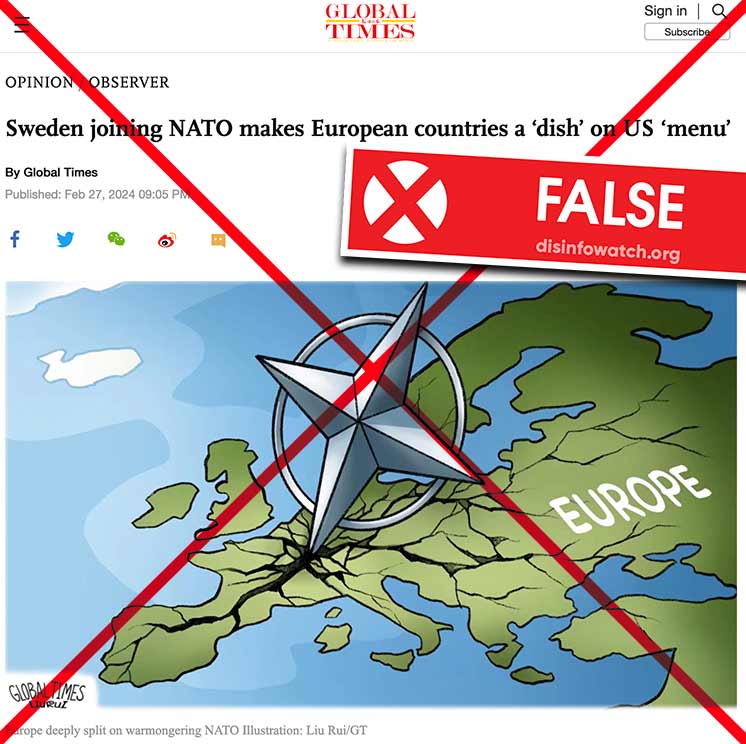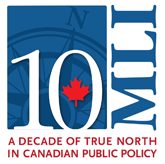
The Claim:
Chinese government state media platform, Global Times, published a piece in response to Sweden’s coming formal accession to NATO, falsely claiming that Sweden’s membership will destabilize Europe. The article accuses Sweden and Europe of being “paranoid about the security threats posed by Russia” and that it is not Russia but “NATO that is creating an atmosphere of fear in Sweden.” The Chinese regime platform warns that by “taking sides now [Sweden] could significantly threaten its national security.”
The article includes the wildly false claim that NATO members are controlled by the United States, stating that: “the US needs a “brain-dead” NATO so that member countries can act entirely in the interests of the US without thinking.”
Narrative Context:
This Global Times article frames Sweden’s NATO accession to fit China’s and Russia’s geopolitical objectives. The main themes and their alignment with these objectives are as follows:
Criticism of NATO’s Expansion: The article argues that NATO’s expansion, particularly Sweden’s accession, does not enhance security but rather increases insecurity in Europe. This narrative aligns with Russia’s long-standing position that NATO’s eastward expansion is a threat to its security and a provocative action. It also echoes China’s broader stance against US-led alliances, which Beijing often portrays as destabilizing and hegemonic.
Portrayal of the US as Manipulative: The article suggests that the United States is manipulating European security concerns to further its own geopolitical interests. This supports China’s and Russia’s false narratives and conspiracies about the US as a self-interested actor that undermines global stability for its own gains. The claim that the US uses NATO as a tool for maintaining global hegemony aligns with both PRC and Kremlin criticisms of American foreign policy.
Skepticism Towards the Threat Posed by Russia: The article downplays the threat Russia poses to European security, quoting President Putin’s statement on the lack of threat from Russia to Finland and Sweden. This reflects The Kremlin’s narrative that Russia is not an aggressor in Europe.
US is Exploiting Russia’s War Against Ukraine for Economic Gain: The narrative suggests that NATO’s expansion weakens rather than strengthens European security and economic stability. It points to economic challenges within Europe, contrasting them with Russia’s resilience and the US’s purported exploitation of the conflict in Ukraine to advance its energy exports. This serves to sow doubt about the benefits of alignment with the US and highlights the costs of confrontation with Russia, aligning with Chinese and Russian interests in presenting alternatives to US-led security arrangements.
Casting Doubt About Alliance Unity and Purpose of NATO: By describing NATO as “brain-dead” and suggesting that its expansion could actually weaken the alliance, the article feeds into narratives that question the efficacy and unity of Western alliances. This supports China’s and Russia’s strategic objectives by undermining confidence in Western institutions and promoting the perception of declining Western influence.
The narratives included in this Chinese state media article serve to undermine confidence in Western alliances, sow division between Europe and the US, and present China and Russia as reasonable actors in a multipolar world.
The Facts:
Russia’s 2022 unprovoked invasion of Ukraine has raised concerns throughout Europe regarding Russia’s broader geopolitical intentions, including those related to the Baltic Sea region. In response to Russia’s unprecedented aggression against Ukraine, Finland and Sweden both decided to join NATO to secure their safety and deter further Russian aggression against their nations and within the Baltic Sea region.
There is no evidence to suggest that the Kremlin will refrain from expanding its current aggression. On the eve of its invasion of Ukraine, the Kremlin, along with many of Russia’s enablers, influencers, and proxies in the Western world, denied any plans to attack its neighbour.
NATO is a collective defence organization where all decisions are made by consensus, following discussion and consultation among its 31 member countries. No single country has the power to veto decisions or make unilateral decisions.

